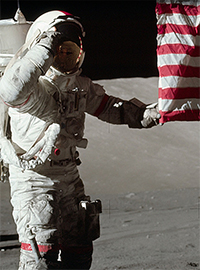| Rare Bright Spot: U.S. Still Leads in Intellectual Property Protection |
 |
|
By Timothy H. Lee
Thursday, August 25 2016 |
The United States accounts for just 4% of the world's population, and our brief 240-year existence remains a blink of an eye relative to other cultures hundreds or even thousands of years old. Despite that, America stands unrivaled in human history in terms of sheer innovation, prosperity and power. From powered flight to the moon landing, from telephones to the Internet, from vaccines to surgical advances, from silent film to "Star Wars," from jazz to rock and roll, from the Coca-Cola sign to the Apple logo, no nation approaches our achievements and legacy. So how did that come to pass? It cannot be explained by our natural resources, since other nations of equal or greater size like Russia, China and Brazil match or exceed our own bounty. Nor can it be attributed to coincidence, as the innovative disparity is simply too large and too enduring to be dismissed as proverbial lightning in a bottle. Rather, we owe our unique standing primarily to our tradition of protecting intellectual property (IP) rights, as highlighted again this week by the release of the 2016 International Property Rights Index by the Washington, D.C.-based Property Rights Alliance (PRA). So what is "intellectual property," and why is it so important? Intellectual property refers to a property right that someone possesses for creations of the mind as opposed to physical property or real property like land. With copyright, for instance, think of the protections to which someone is entitled for writing a song, or the protection against plagiarism to which an author is entitled for writing a novel. With patent rights, think of inventors who produce such things as lifesaving drugs or new smartphones. And with trademarks, think of the famous Coca-Cola or Apple symbols referenced earlier. Amazingly, the total estimated value of American IP stands at approximately $5 trillion, which by way of comparison exceeds the entire gross domestic product (GDP) of any other nation on the globe except China's second-place total. Our IP also accounts for over half of our exports, which in an increasingly competitive world market looms more important by the day. Businesses reliant upon IP exports also employ nearly 55 million workers, whose average wages stand nearly 30% higher than non-IP counterpart employees. So what explains our two centuries of unrivaled innovation and consequent prosperity? Our unique tradition of protecting IP rights. Many alternative legal regimes exist across the world, providing less protection for IP, and have existed over the decades and centuries. But it is America that has delivered more inventions, more artistic and cultural creations and a better standard of living than anything the world has ever known. That all starts with our Constitution., which reads, "The Congress shall have the Power ... [t]o promote the Progress of Science and useful Arts, by securing for limited Times to Authors and Inventors the exclusive Right to their respective Writings and Discoveries." As Abraham Lincoln later noted, "The patent system added the fuel of interest to the fire of genius." Although that justifiably highlights the utilitarian benefits of IP protections, our system equally reflects a natural rights view. In other words, not only do IP rights provide societal incentive for innovation, they advance fairness and justice by securing for innovators the fruits of their labor and expense. As James Madison stated in The Federalist No. 43, "The copyright of authors has been solemnly adjudged, in Great Britain, to be a right of common law," which reflects philosopher John Locke's proclamation that, "Our handiwork becomes our property because our hands - and the energy, consciousness, and control that fuel their labor - are our property." Simply put, our creations are our property no less than physical objects or land. And the results of our system speak for themselves. Fortunately, despite other areas of U.S. decline over the past decade in such areas as economic freedom and regulatory onslaught, we remain the world's leading protector of IP. That is the takeaway from PRA's annual property rights report on 128 nations across the world. Although the U.S. lags in a disappointing 15th place in PRA's overall property rights calculation (which also measures nations' (1) legal/political environment and (2) physical property rights in addition to IP rights), it remains atop the world index's IP component. Perhaps that helps explain how the U.S. has stagnated economically in the Obama era, with its grotesque levels of overspending, overregulation, higher taxation and decaying rule of law, yet continues to lead the world in technological and artistic innovation. Our IP standing must be safeguarded against decay, lest our leadership in worldwide innovation begin to erode as well. |
Related Articles : |
























